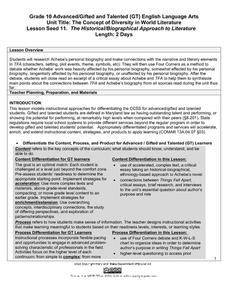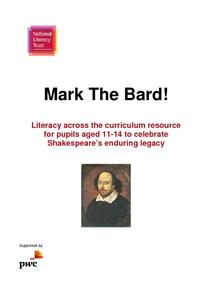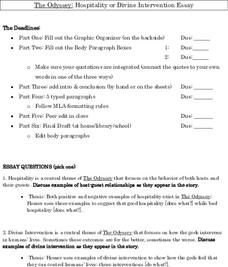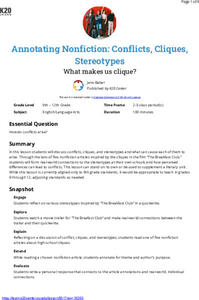We are Teachers
Read Like a Detective
Encourage your young readers to become true detectives in their next literary adventure! Here you'll find an attractive display that will prompt your learners to constantly be looking for clues, asking questions, making cases about the...
Macmillan Education
The Tell-Tale Heart
Rather than who done it, the mystery literary detectives have to solve as they examine the evidence found in Edgar Allan Poe's famous "The Tell-Tale Heart" is why did he do it?
National Endowment for the Humanities
Close Reading Worksheet
A passage from Edith Wharton's Ethan Frome provides the text for an assessment that asks readers to use evidence from the excerpt to decide if Ethan is a victim of his social and physical environment, or of his own personal choices and...
Maryland Department of Education
The Concept of Diversity in World Literature Lesson 11: The Historical/Biographical Approach to Literature
How affected is Thinks Fall Apart by Chinua Achebe's personal biography? Using a four corners strategy, and evidence from their readings, class members debate the degree of biographical influence in Achebe's novel.
Maryland Department of Education
The Concept of Diversity in World Literature Lesson 1: Unit Introduction
To launch a unit study of the concept of diversity in World Literature, class members compare Chinua Achebe's essay, "An Image of Africa: Racism in Conrad's Heart of Darkness" and Richard Rodriguez's essay, "The Chinese in All of Us: A...
Novelinks
The Tempest: List-Group-Label (After Reading)
Collaborate with your class after reading William Shakespeare's The Tempest with a group labeling activity. As you note key concepts or words from the play on the board, class members suggest associations and connections to each one, and...
Novelinks
The Tempest: A-Z Book Project
Create a picture dictionary for one of William Shakespeare's most famous plays. After readers finish The Tempest, they assign each letter of the alphabet to a concept or character, and add a description and evidence from the text to the...
National Literacy Trust
Mark The Bard!
Commemorate the 400th anniversary of Shakespeare's death with a packet of cross-curricular literacy lessons and activities centered around two of the Bard's most popular plays, Macbeth and The Tempest. Class members look for evidence of...
Great Books Foundation
Discussion Guide for Handmaid's Tale
Great literature discussions are a consequence of carefully crafted questions, interpretative questions that permit more than one response, and responses supported by specific evidence from the text. The discussion questions in a guide...
Great Books Foundation
Discussion Guide for Jane Eyre
The ambiguity in Charlotte Bronte's Jane Eyre makes the novel a perfect choice for a shared inquiry discussion. Readers respond to open-ended questions with evidence drawn directly from the text.
College Board
2011 AP® English Language and Composition Free-Response Questions Form B
Strong writers support their points with direct evidence and details. A series of free-response questions from the 2011 AP® English Language and Composition exam require the use of details to obtain a good score. The first prompt...
College Board
2008 AP® English Language and Composition Free-Response Questions
Are your high school scholars ready for college?
Administering the 2008 AP® English Language and Composition Free-Response
Questions tells much about a
pupil's readiness for high level English courses. The resource offers three
questions...
College Board
2006 AP® English Language and Composition Free-Response Questions
What does your lawn decoration say about you? The 2006 AP® English Language and Composition Free-Response Questions offers three prompts in which scholars express themselves through essay writing. One of these tasks includes analyzing...
Literacy Design Collaborative
"New American Characters" - Analyzing the Impact of Cultural Change in "The Great Gatsby"
Learners annotate text from The Great Gatsby before working through a character development map. They then use text evidence in a final essay to describe the connection between central ideas and character development.
PBS
A Time and Place: The Importance of Setting in To Kill a Mockingbird
A strong community acts as a family during difficult times. The evidence for the family aspects of Maycomb is abundant in Harper Lee's To Kill a Mockingbird, and it is the focus of a lesson on the importance of setting as it relates to a...
Weber County Library
Abstract Ideas Explored: Writing with Extended Metaphor
A 25-page packet includes eight detailed lesson plans centered around poems by Emily Dickinson. Each lesson begins with a burning question that high schoolers attempt to answer by using evidence from Dickinson's poems.
Academy of American Poets
Teach This Poem: "Maps" by Yesenia Montilla
After examining a physical map of the world, learners conduct a close reading of Yesenia Montilla's poem "Maps." They note the interesting words and phrases, the way the poem is structured, and list questions they might have. After...
Curated OER
The Odyssey: Hospitality or Divine Intervention Essay
Conclude a study of The Odyssey with a writing assignment that asks readers to investigate a central theme in Homer's tale. Scholars either provide positive and negative examples of hospitality or look for evidence of how the gods...
Simon & Schuster
Curriculum Guide to: A Tale of Two Cities by Charles Dickens
A Tale of Two Cities is the core text for five lessons in a Curriculum Guide for Charles Dickens' famous novel. To begin, scholars examine Dickens' use of anaphora in the first line of the novel. Next, they compare the point of view in a...
National Endowment for the Humanities
Scrooge as He is Revealed during the Ghostly Experiences
Readers learn how to use both direct and indirect characterization clues provided by Charles Dickens to understand the complexity of Ebenezer Scrooge's character. Scholars collect evidence of comments Scrooge hears, how he responds to...
National Endowment for the Humanities
Dramatic Perspective in Moby Dick
A instructional activity on Herman Melville's Moby Dick asks readers to compare the first person point of view of Ishmael in Chapter 1 to Captain Ahab's dramatic monologue in Chapter 37. Readers cite evidence from the chapters to support...
National Endowment for the Humanities
Literary Genres in “Moby-Dick”
Moby Dick is more than a whale of a tale narrated by Ishmael. A lesson studying Herman Melville's classic novel asks readers to examine the different genres the author weaves into his story. Instructors model how to conduct a stylistic...
National Endowment for the Humanities
Dostoevsky's Crime and Punishment
Pain and suffering do not have to be inevitable in a study of Crime and Punishment. A carefully scaffolded lesson plan introduces readers to the divided natures of the characters in Fyodor Dostoevsky's complex novel. Groups use the...
K20 LEARN
Annotating Nonfiction - Conflicts, Cliques, Stereotypes: What Makes Us Clique?
John Hughes' The Breakfast Club takes center stage in a instructional activity about annotating nonfiction texts to keep track of evidence that may be used later in discussions and writings. Scholars consider the stereotypes and...
Other popular searches
- Evidence of Evolution
- Evidence for Evolution
- Citing Textual Evidence
- Textual Evidence
- Evidence for Plate Tectonics
- Supporting Evidence
- Continental Drift Evidence
- Archaeological Evidence
- Dna Evidence for Evolution
- Cite Evidence in Text
- Evidence for Geologic Time
- Indirect Evidence

























